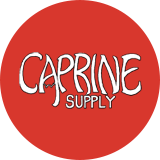Basic Feeding
There are as many different "right" ways to feed goats as there are breeders. One breeder challenge-feeds her dairy goats. Milking does got a pound of grain for every two pounds of milk they produced. Another breeder feeds alfalfa hay free choice but limited grain. Dry does got no grain at all. Milkers got three pounds of grain a day, no more. Another feeds an all-in-one ration about half cottonseed hulls, free choice, and no hay at all. All are convinced that their feeding plan is the "right" one, and it is - for their herd.
Here is a more usual feeding program:
Most animal nutritionists agree that a 14% to 16% protein grain mix works well for dairy goats. Make sure that the dairy mix you buy isn't dusty. Goats prefer no-dust grain that is glued together with plenty of molasses. Substitute a horse grain mix if your local dairy mix doesn't have enough molasses to suit your goats or if it is too dusty.
Hay is a critical factor. If you can get well-cured high-quality legume hay, it should be high in protein, and you will need less protein in your grain mix. If the best hay available is grass, that's just fine, but grass hay has less protein than legume hay, so you'll need a grain mix with more protein in it. Make sure that your hay is not overly dusty or moldy. As with the grain mix, goats don't really like dusty hay, and moldy hay can make them very, very sick.
In certain parts of the country, finding good hay is very difficult. Talk with other local breeders, and check with horse breeders and your local cow dairy, if necessary. Also remember that grass hay is usually less expensive than a legume hay, and it might be more economical (and more healthful to your goats) to feed a good quality grass hay and up the protein with grain and mineral supplements (which you might be feeding anyway).
Growing kids may get a pound of grain a day and all the hay they can consume. Bucks are more variable. Depending upon their size, health, exercise, and amount of use they are getting, you might feed them anywhere from one to four pounds of grain a day and usually grass hay.
In the last two months of pregnancy, you want to put your does on an "ascending plane of nutrition." This means that you want to gradually increase their grain ration. Some breeders feed up to two pounds of grain a day towards the end of pregnancy. Again, watch the condition of your pregnant does. A thin doe, carrying a huge load of kids, the mature does that milks a bunch, they will all probably need more grain.
Many breeders will feed one pound of grain per three pounds of milk produced. Give less to fat does, more to thin ones.
Most breeders feed hay free choice, allowing goats to eat all they want. An adult goat will eat four pounds of hay or more. Make sure that the hay feeders are clean. Goats will often put their feet in the feeders, increasing the possibility of contamination from worms. Goats also have the reputation as picky eaters. They'll eat the leaves off the hay and leave the stem. Check your feeders to make sure that the hay that remains is leafy and palatable, not just stem. You needn't throw away the stemmy leftovers. They make great feed for calves you may be raising on goat milk.
Those raising meat, hair or working (goats for packing or pulling) will probably rely more on forage and you'll need to try to balance your goats' ration with an appropriate grain ration. With working goats especially, you'll need to keep a close eye on their condition and supplement their forage ration if you see they are looking a bit thin.
Water is as important a "feed" as grain or hay. Always provide plenty of fresh, clean water for your goats. They also need a salt block or loose salt. In addition, many breeders will feed a loose mineral mix either free choice or sprinkled on their grain ration. Such supplements may contain beneficial bacteria which are intended to improve digestion and increase feed utilization. There are other mineral mixes meant to balance the calcium and phosphorus in your goats' diet. Finally, you can feed your bucks a mineral supplement meant to help increase their fertility and potency and improve their overall condition.

Log In